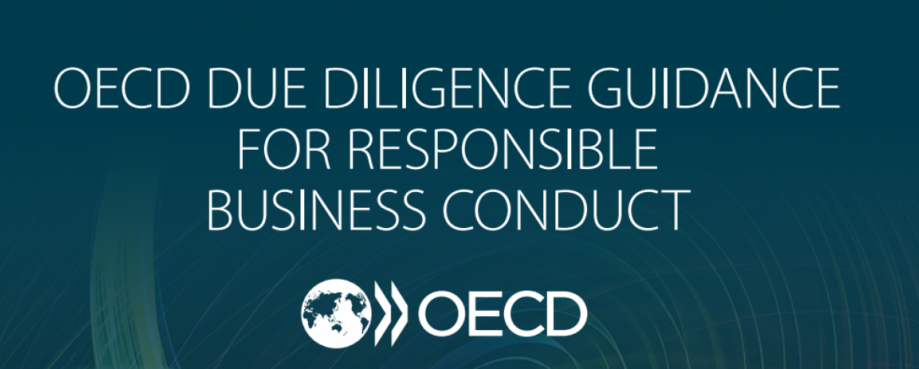
The OECD has just published the most authoritative, detailed guidance yet for businesses looking to prevent and tackle human rights abuses and other harmful impacts in their supply chains.
Due Diligence Guidance for Responsible Business Practice has been endorsed by 34 OECD member states, plus a host of other governments who have agreed to adhere to the OECD’s recommendations on responsible business conduct.
The guide sets out to ‘provide practical support to business on the implementation of the OECD Guidelines… by providing plain language explanations of its due diligence recommendations.’
It covers human rights and industrial relations, bribery, consumer welfare, environmental impact, and various other issues too.
Whilst aimed primarily at multinational companies, the guidance should be useful for other organisations as well, including multi-stakeholder initiatives, trade unions and civil society.
The OECD has already published sector-specific guidance for the apparel and footwear, agriculture, mineral and extractive sectors. The difference here is that this guidance is non-sector-specific, and therefore companies anywhere and in any sector can and should use it.
It is broadly in line with our own approach as set out in our Due Diligence Framework and in the training we offer to companies, and builds on requirements set out in the UN Guiding Principles on Business and Human Rights.
Governments need to act
Ultimately, the extent to which companies will conduct effective due diligence depends on government action.
National governments should aim to align themselves with the OECD’s standards, whether through national action plans, modern slavery laws or labour rights policies, with clear expectations that companies should conduct effective due diligence.
France is already one step ahead. The recently passed “Devoir de vigilance des entreprises donneuses d'ordre” law requires large companies to implement due diligence plans to prevent negative human rights and environmental impacts.
Unfortunately, UK law and policy are lagging: at present, there are no domestic requirements for companies to conduct broad due diligence focusing on the welfare of workers and communities impacted by supply chain operations.
The UK Modern Slavery Act was one of the first laws in the world to address slavery and trafficking in the 21st century, and requires companies with an annual turnover of £36m to make a public statement setting out all the steps they are taking to prevent and tackle modern slavery in their supply chains.
Yet the OECD guidance, which the UK Government has endorsed, recommends that companies with international supply chains should go much further than simply publishing statements on forced or child labour.
The OECD’s Due Diligence Guidance asks companies to
- Embed responsible business conduct into policies and management systems
- Identify and assess actual and potential adverse impacts associated with the enterprise’s operations, products or services
- Cease, prevent and mitigate adverse impacts
- Track implementation and results
- Communicate how impacts are addressed
- Provide for or cooperate in remediation when appropriate
Small companies have duties too
It’s no longer just the largest multi-national companies, or those wishing to be considered leaders in the world of ethical trade, who need to demonstrate responsible business conduct.
For instance, the OECD expects that all multinational enterprises, regardless of their size, sector or ownership structure, should provide for or cooperate in remediation for workers.
That includes small and medium-sized enterprises (SMEs), subsidiaries and domestic supply chain partners.
The guidance also shows how the UNGPs are being implemented globally, with clear requirements for businesses to ensure they have positive rather than negative impacts on the societies in which they operate.
Act now or pay later
More national laws and policies are likely to follow mandating this type of due diligence and opening up the possibility of civil or criminal penalties.
For example, in 2017, the UK Parliamentary Joint Committee on Human Rights recommended that the UK government should consider creating a new corporate offence of failing to prevent human rights abuses.
As yet it hasn’t happened, but increasingly businesses are being held accountable for contributing to modern slavery and other abuses that occur in their supply chains.
At ETI, we recommend that all businesses carry out risk-based due diligence to avoid and address any adverse impacts of their operations, supply chain or other business relationships.
We also recommend that businesses do this with the aim of achieving positive economic, environmental and social impacts. ‘Compliance’ with domestic laws that fall below international standards is no longer enough, particularly when enforcement is poor, or governments corrupt and undemocratic.
In short, businesses need to step up and take their responsibilities seriously or face the consequences, while governments need to respond to make global respect for human rights the new normal for business.
For information on implementing the UNGP’s and conducting Human Rights Due Diligence that relates to labour rights risks, see ETI’s Human Rights Due Diligence Framework, which serves as a guide for companies to help manage and mitigate risks, and understand why engagement, negotiation and collaboration are the best way to succeed.
Read more about ETI's human rights due diligence training.
